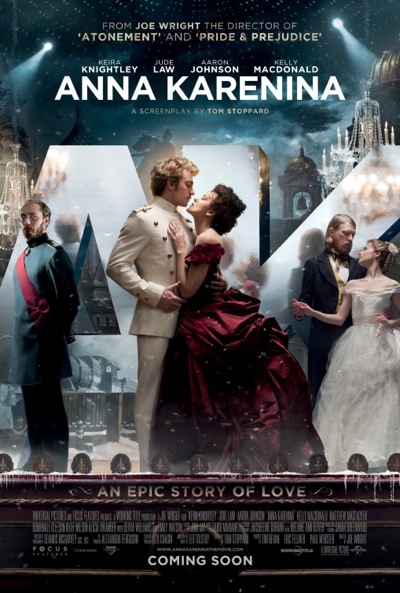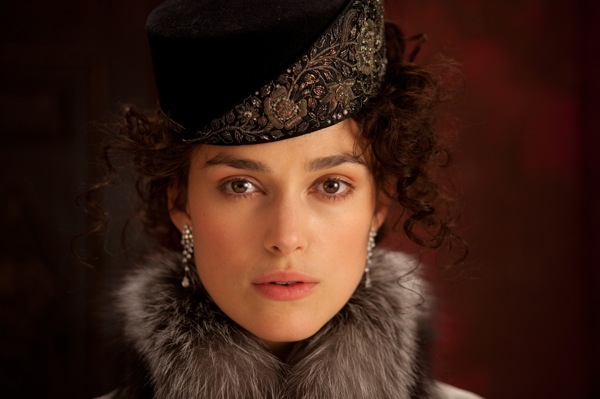
Filming Leo Tolstoy's ANNA KARENINA is a daunting enough prospect; starring in the complex titular role previously brought to life by the iconic likes of Greta Garbo and Vivien Leigh invites catastrophe. But Keira Knightley has never lacked for confidence... or talent... or beauty, and she has found in Tolstoy's tortured aristocrat an ideal vehicle for her considerable gifts.
Knightley's Anna is an intriguing mixture of elegance, intellect and barely restrained passion (landing somewhere between the Garbo and Leigh interpretations), but it isn't until she finally gives in to her illicit desire that the greatness of the performance becomes apparent. Knightley can do guns-blazing sensuality all day long (as amply demonstrated in her 2011 Chanel Coco Mademoiselle ad), but what makes her fascinating as an actress is her ability to draw out the psychological turmoil of her characters. In this film, it's Anna's unique strengths as a woman in 19th-century Russia that are her undoing, and it is crushing to observe her slow descent. It's lovely, emotionally textured work - possibly Knightley's best performance to date.
ANNA KARENINA is also Knightley's third film with director Joe Wright, and, given the bold theatrical conceit, it's easily their most adventurous collaboration. When I chatted with the actress last week, I was curious to learn how they connect creatively, and whether the heavily stylized approach to this film provided any new challenges. We also talked about working with playwright Tom Stoppard (who brilliantly adapted the novel), and the cult following that Mark Romanek's NEVER LET ME GO has gradually acquired.

Mr. Beaks: You and Joe have become a pretty dependable pairing. How has your creative collaboration evolved over the years?
Keira Knightley: I suppose the main difference is that when we first started to work with each other, we were coworkers. Now we're friends, and we know so much of each other's lives. So there's all of a sudden a whole other realm of things to pull from - frames of references that we both know, having known each other over the last eight or nine years. I think what was fascinating on this one was... there had been a point on ATONEMENT where we almost didn't need to speak. We just had this weird thing where I knew exactly what he meant, and he knew exactly what I meant. There wasn't much talking. Whereas on this, and I think it's partly to do with Anna's nature as a character because she's a very strange beast, we talked a lot on this. And we didn't always agree. There was a lot of discussion and a lot of headbutting. But ultimately the main thing within our relationship is trust. I love his taste, and I love his imagination, and I guess he sort of likes mine. We always know the frames of references that we're talking about, and there's an implicit trust that we're going to get where we need to go.
Beaks: You were attached to this before Joe decided to take this theatrical approach. What did you think when he came to you with that idea?
Knightley: I always knew there was going to be a stylized element, because over the last couple of years he'd been talking about it. I knew he was interested in trying to break the fourth wall in cinema, and feeling quite claustrophobic because of naturalism, so I always knew that there would be a stylized element to this. But when he phoned me twelve weeks before we started shooting, and said, "Just come around my office." (Laughs) I went to his office, and it was like a madman's cell. It was just covered with all of these sketches and drawings and pictures and references of this theater. He explained it, and I like, "Oh, no! Here we go again!"
But I think the thing that we both found quite shocking... it's kind of like you said, which is we'd become dependable. It was the first time that we'd done something where people could say, "Oh, it's you and you, and you're doing an adaptation. Oh, that'll be good." When we did PRIDE AND PREJUDICE, everybody was like, "Oh, she's from the [PIRATES OF THE CARIBBEAN] films, so she'll be shit. And who's he? He's just done telly? That'll be shit." And ATONEMENT was the unfilmable novel, so everybody was like, "Oh, they were just lucky the first time." Suddenly, we were faced with, "Oh, that'll be really good." I think that kind of shocked both of us, and I don't think we were that comfortable with it. So I think there was a feeling of needing to get out of our comfort zone, and of doing something that had a very real possibility of failure within it. And it's not just me and Joe: it's the costume designer, the lighting designer, the makeup artist... it's a team that's worked together over a number of years. And I think we all felt like we really, really wanted to push ourselves. So when he came up with it, my initial reaction was "Oh god." And then it was like, "Okay, yeah. I know this group of people will give 150 percent, and the worst that can happen is that we fail. But the greater tragedy would be if we didn't try." So we all just grabbed each other's hands and jumped off the cliff.
Beaks: Knowing there would be all of these complicated long takes and choreography, is that exhilarating?
Knightley: Definitely. Because of the way that he was doing it, it was incredibly exciting. He wanted movement to be such a massive part of it, which it isn't normally onscreen. Screen actors normally work from the neck up. We work in close up. You don't normally have to use the rest of your body. So suddenly going, "Okay, how can we also tell this story through stylized movement" was something I'd never done before. And it was absolutely fascinating. We did about three weeks of workshops with Sidi Larbi Cherkaoui, the choreographer, just on trying to find different ways of telling the story in different movement-based kinds of things. So the whole of the rehearsal period for me and Aaron [Taylor-Johnson, who plays Vronsky] was entirely done in movement improvisation. We didn't speak at all. We just did these strange choreographed very modern movement-based pieces. It was totally fascinating for me and really exciting.
Beaks: You're inhabiting this world of theatrical artifice. How does that impact the way you interpret the character?
Knightley: It doesn't impact the emotional reality of the character. Neither of us wanted to lose that in it. We wanted other tools that we could use as well, not tools that would mean that we couldn't make it as emotionally raw as possible. Saying that, it definitely has a sort of operatic quality to it, so the idea that you could actually not just do a naturalistic piece and not just a naturalistic performance, but occasionally take it into a very stylized performance was something that was very interesting. It was something else to play with.
Beaks: Did you have much contact with Tom Stoppard?
Knightley: Yeah, yeah! He was there for the whole of the rehearsal period and on set quite a lot. I sat around tables with Tom and just talked through everything just to make sure that we understood exactly what he was trying to get at in the script, just in case there was anything we didn't understand or felt that he'd missed or anything like that. So we had, again, within the three weeks of movement rehearsal, me and Jude would be there at the end of the day with Tom and just be discussing [the script] and trying to figure everything out - which was fantastic because I think Tom is pretty much one of the most intelligent men in the world. (Laughs)
Beaks: Greatest living playwright and all that.
Knightley: Pretty much. So it was brilliant to get a load of hours to pore over material with him and get his ideas.
Beaks: Any bits of advice or wisdom that he passed along to you?
Knightley: Not particularly. We were all just in it together. He did actually give us a lecture of what he thought the themes behind the book were. He thinks the whole book is a thesis on love in its entirety, and gave the whole cast a half-hour lecture on exactly why he thought that was. But apart from that it was really just a discussion. What's wonderful about Tom is a lot of the time he'd say, "My job is to adapt the whole thing, your job is to play the character. I'm not thinking all the time what she's thinking. That's your job." It's wonderful to be given that freedom, particularly from someone like Tom.
Beaks: You've done some comedy recently to break up the big dramas. Career-wise, how are you striking the balance?
Knightley: I got to the end of ANNA KARENINA and realized that I'd either died in films or played characters in really dark films over the last five years. I really wanted to do something different, so this year has been the year of either hope or light entertainment. I did a film about friendship and making an album called CAN A SONG SAVE YOUR LIFE?, which is entirely hopeful. And I'm doing a proper Hollywood thriller [JACK RYAN] with a lot of running around and explosions. I think my natural home and the place I enjoy the most is always going to be the darker dramas, because I find them fascinating. But I think you do have to shake it up. It's fun to shake it up, and quite a relief. So suddenly doing a modern-day comedy or a modern-day thriller or whatever that might be, and then going back to something else is the most interesting. It keeps you on your toes. I don't want to be somebody that just works in one genre and doing one thing, even if what I like the most is drama - and it is what I love the most. But I think it's very important to keep changing.
Beaks: One of my favorite films of the last few years is NEVER LET ME GO. You were fantastic in it - all of you were. When it came out, it didn't quite hit, but it's gradually acquired a bit of a following. Have you noticed this?
Knightley: It's quite amazing. I've done quite a number of films actually where they haven't necessarily hit when they first came out, and got either mixed reviews or bad reviews, and then all of a sudden they gain a different life afterwards. I think that's really exciting. And to tell you the truth, when you do a film like NEVER LET ME GO, you never really expect them to quite find their place initially. You hope that they will, but it wasn't a great surprise that it didn't. But it's also not a surprise that people are now going, "Oh, that's really cool!" Because that's exactly what we thought about it when we first read the script and when we were trying to make it. That's what I love about doing those smaller movies. People feel like they can find them themselves, and they have a very personal connection to it because they've had to dig around and find it.
Let's not allow ANNA KARENINA to be one of those late bloomers. It's in theaters now, and it's as exhilarating an experience as you're likely to have in a movie theater this year.
Faithfully submitted,
